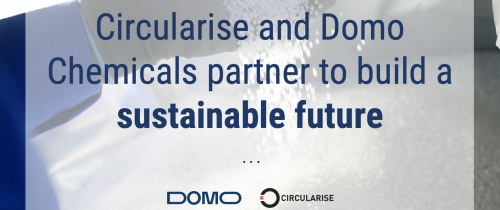Focusing on the main pillars of the circular economy is paramount for Domo’s long-term success. This means closing the loops more effectively and making materials go more rounds. Already now by improving the processability and functionality of plastic products, the company achieves lower CO2 emissions and water & energy needs. Domo also focuses on reusing and recycling practices by putting post-industrial or end-of-life recycled feedstock from its own production and other industries back into the system.
What we should realise, however, is that advancing towards a circular economy will take more than changing the quality of the materials or creating new ways to recycle. In order to cut waste, reduce emissions, and generally create the most sustainable solutions a greater cooperation throughout the plastics value chain is required. One of the biggest barriers in doing so is the inability of each member along the supply chain to share information about materials and products without exposing sensitive data. Another one is the inability to track the provenance of all materials, products and components. To address these issues, Domo Chemicals partnered with an innovative supply chain transparency start-up Circularise and the supplier of high-tech polymer materials Covestro.
Industry standard for sharing data
In 2019, Domo, Covestro and Circularise have announced a collaborative project for circularity in the plastic industry through the use of blockchain technology. According to Thomas Nuyts at Domo “The aim of this project is to set up an open communication standard around sharing data required to move to a circular economy. Having this standard would improve transparency throughout the whole plastics value chain. It will also make providing evidence of provenance for an object, as well as communication of such information as recycled content, audit reports and certificates to our customers and end consumers a lot easier.”
For Domo this should simplify the required transparency around the sustainable portfolio. At the same time the company would be able to track the lifecycle of our materials and more effectively reuse, repurpose and recycle them, creating new opportunities for businesses via tracing new circular feed stocks.
“Everyone in the plastics sector understands the need for such a data sharing standard. Now is clearly the right time to set-it up and for that we need the cooperation of the whole plastics industry. The standard allows us to communicate nearly anything around a material and its value chain. Now that we’ve validated the concept we need brand owners and final customers to tell us what is most valuable to collect and trace in a circular economy” says Thomas Nuyts.
Reducing environmental footprint
Supporting Domo’s commitment to the circular economy, the company released Econamid® product line, which provides an efficient solution for strengthening post-industrial recycling. “The production of Econamid® resins requires nearly 50% less water, emits 80% less CO2, and consumes 60% less non-renewable energy compared to the production of prime-grade polyamide.” [Data refers to ECONAMID 6G30 vs PA6 virgin based, 30% glass fiber.] The customizability of solutions, greener profile, and the availability of certified data by the EPD systems, make them ideal for a wide range of applications in automotive, E&E, building and construction, sports and leisure industries and generate significant value throughout the product life cycle.
“At DOMO ‘Caring is our formula’, we are formulating solutions that strike the right balance between people, planet, products and profit. It is our way to do business. It is a long term commitment and we invite our industry peers and customers to join us in this journey for sustainability. Joining the Circularise consortium is a first opportunity, yet innovating and partnering with us is another,” says Thomas Nuyts.

